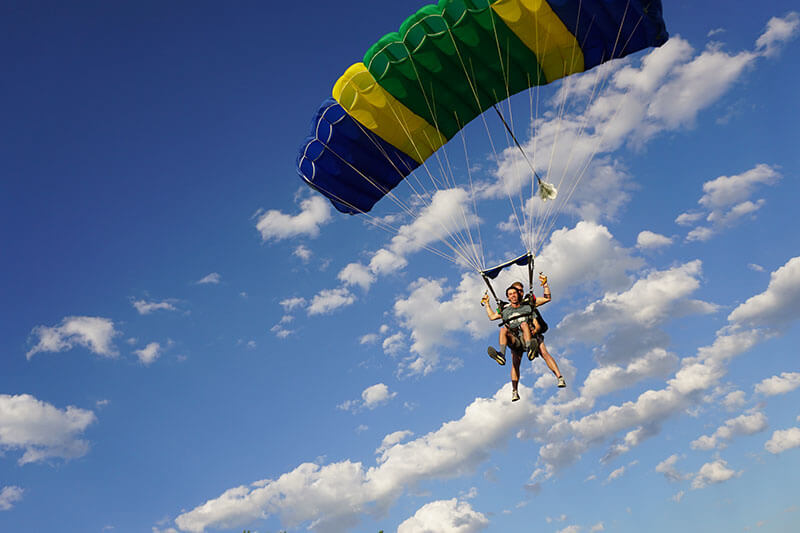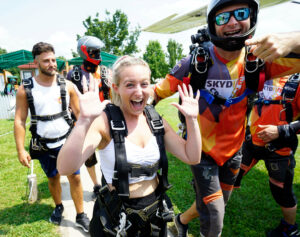Tandem Skydiving Requirements: Height, Weight Limit & Age

Are you ready to take flight? We don’t mean a comfy cruise in the confines of a commercial aircraft. We mean really take flight. Are you ready to take a leap from the “safety” of a plane at 13,500 feet into the wild blue yonder, freefalling at 120 mph?
Before the big jump, there are a few skydiving requirements you must first consider. Namely, in order to skydive at Skydive Cross Keys, you’ll need to weigh less than 250 lbs, be height/weight proportionate, be at least 18 years of age, be in moderately good health, and speak English. Got questions? We’ve got answers. Let’s delve a bit more into the skydiving requirements you need to know.
Tandem Skydiving Requirements
- Skydiving Weight Limit
- Skydiving Height Requirements
- Skydiving Age Requirement
- Skydiving Health Requirements
- Skydiving Language Requirement
Before we explore requirements for tandem skydivers, you might be wondering: what exactly is tandem skydiving? Tandem skydiving is one of the most accessible ways to experience the sport of skydiving. When skydiving tandem, you are attached via harness at four connection points to a professional, licensed skydiving instructor wearing a skydiving rig. This rig is designed especially to be used for tandem jumps and to handle the weight load of two participants (which is why there is a tandem skydiving weight limit, but we’ll get into that a bit later). Within the skydiving rig, there are two parachutes, a main and a reserve, as well as an Automatic Activation Device, which deploys the reserve parachute in the event the jumper doesn’t do so.

On a tandem skydive, the tandem instructor takes the lead. They are in charge of deploying the parachute at the appropriate altitude, flying the parachute during freefall time, and landing the parachute. As the tandem student, though, you are not just a passive passenger. You have a role to play, and it is imperative that you listen to the instructions your tandem instructor gives.
Now that you have a little glimpse into what a tandem skydive is, here are the skydiving requirements you need to know.
Skydiving Weight Limit
What weight do you have to be to skydive? This is one of the most frequently asked questions we get! Before we jump into specifics, it’s important to note that skydiving weight restrictions are not in place to be discriminatory. Weight limits are in place in order to keep tandem skydivers safe.
Skydiving gear has to be issued a Technical Standard Order (TSO) by the Federal Aviation Administration (FAA). The TSO specifies the conditions under which the equipment will function properly. The majority of tandem rigs are approved to bear a maximum weight limit of 500 lbs. This total weight includes the tandem student, the tandem instructor, and the skydiving rig itself (which is about 60 lbs). To remain beneath the maximum weight limit of the equipment, Skydive Cross Keys has a weight limit of 250 lbs for tandem skydiving students.
Additionally, in order for proper harness fit, it is important that skydivers are height-to-weight proportionate. Plus size skydiving is possible as long as the individual is under the skydiving weight limit, and the skydiving equipment fits properly and can fasten securely.
Another thing to consider when discussing weight restrictions is the toll that supporting another adult has on the tandem instructor. Because of the added physical strain on the instructor and the increased load on the gear, we are stringent about our skydiving weight limit. Our weight limit for tandem skydiving is in place to help mitigate skydiving risks and to maintain the comfort of our instructors and students.
Skydiving Height Requirements
Related to weight is of course height. Can you skydive if you’re 6’5”? You sure can! It’s rare for an individual to be too tall to skydive. Although, taller individuals may find that they are close to the weight limit simply because of their height.
For individuals at both ends of the spectrum, from petite to towering, as long as the skydiving harness is able to fit properly and the individual meets the other skydiving requirements, the individual should be able to skydive.
Skydiving Age Requirement
Here’s the second-most frequently asked question we see – how old do you have to be to skydive? The short answer is 18 … and here’s why.
Skydiving is a thrilling adventure that comes with certain inherent risks. While these risks are mitigated through state-of-the-art equipment and technology, advancements to skydiving training, and meticulous aircraft maintenance, the decision to skydive is one that each individual should make with full understanding of the risks involved. Skydiving is an extreme sport, after all!

Because of the risks involved with skydiving, it’s important to make an informed decision before taking the big leap. In part, this is why there are skydiving age requirements. Individuals who wish to make a skydive must first fill out a legally binding waiver. In the United States, the validity of this waiver is predicated upon the ability of the individual to understand the waiver and to legally waive certain rights. In the United States, the age of majority – which is fancy legalese for the age at which a person is legally in control of their actions and decisions – is 18. And so, in accordance with the United States Parachute Association (USPA), the age requirement for skydiving is 18.
Note, though, that there is no maximum age limit for skydiving. Truly, you’re never too old to skydive! You simply need to be healthy and in moderately good physical condition.
Skydiving Health Requirements
Generally speaking, skydiving health requirements are pretty cut and dried: an individual must be in moderately good health in order to skydive. Because skydiving is a sport and not just a thrilling ride, participants need to be relatively healthy and have a decent range of mobility. Climbing into and maneuvering within the plane, exiting the aircraft, maintaining a stable freefall position, and landing all require a bit of flexibility and core strength.
Individuals who have conditions such as high blood pressure, diabetes, seizure disorders, and previous back or neck injuries should check with their physician before making a skydive. If you are unsure if a health condition will preclude you from skydiving, check with your doctor before booking your jump.
Skydiving Language Requirement
At Skydive Cross Keys, we require our jumpers to be able to speak English. The required paperwork and waivers you’ll complete at check-in are in English, and it’s important that you and your instructors as well as other team members around the dropzone are able to seamlessly communicate. This requirement is by no means intended to be discriminatory; it’s a matter of safety and responsibility.
Ready to soar to new heights? Call the dropzone or visit our website to schedule your first skydive with Skydive Cross Keys today! Blue skies!